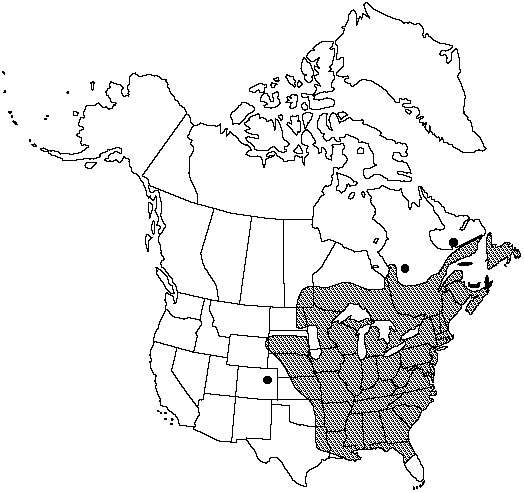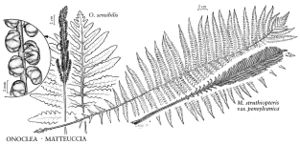Difference between revisions of "Onoclea sensibilis"
Sp. Pl. 2: 1062. 1753.
FNA>Volume Importer |
GeoffLevin (talk | contribs) m (Deleted formae (FNA does not include them as synonyms), and corrected authority for remaining synonym) |
||
| (9 intermediate revisions by 3 users not shown) | |||
| Line 8: | Line 8: | ||
}} | }} | ||
|common_names=Sensitive fern;onoclée sensible | |common_names=Sensitive fern;onoclée sensible | ||
| + | |special_status={{Treatment/ID/Special_status | ||
| + | |code=F | ||
| + | |label=Illustrated | ||
| + | }} | ||
|basionyms= | |basionyms= | ||
|synonyms={{Treatment/ID/Synonym | |synonyms={{Treatment/ID/Synonym | ||
| − | |||
| − | |||
| − | |||
| − | |||
| − | |||
| − | |||
|name=Onoclea sensibilis var. obtusilobata | |name=Onoclea sensibilis var. obtusilobata | ||
| − | |authority= | + | |authority=Torrey |
| + | |rank=variety | ||
}} | }} | ||
|hierarchy=Dryopteridaceae;Onoclea;Onoclea sensibilis | |hierarchy=Dryopteridaceae;Onoclea;Onoclea sensibilis | ||
| Line 26: | Line 25: | ||
}}<!-- | }}<!-- | ||
| − | --><span class="statement" id="st- | + | --><span class="statement" id="st-undefined" data-properties=""><b>Leaves </b>irregularly spaced along stem. <b>Sterile</b> leaves yellow-green, deltate, coarsely divided, 13–34 × 15–30 cm. <b>Petiole</b> of sterile leaf black, 22–58 cm, flattened at base; rachis winged, becoming broader toward apex. <b>Pinnae</b> 5–11 per side, lanceolate; proximal pinnae 9–18 cm, margins entire, sinuate, or laciniate. <b>Sporophyll</b> leaves green, becoming black at maturity, oblong, 7–17 × 1–4 cm. <b>Petiole</b> 19–40 cm, base sparsely scaly. <b>Pinnae</b> linear, 5–11 per side, 2.5–5 cm; ultimate segments revolute to form beadlike structures, 2–4 mm diam. <b>Sori</b> borne on free veins, enclosed by ultimate segments. <b>2n</b> = 74.</span><!-- |
-->{{Treatment/Body | -->{{Treatment/Body | ||
| + | |phenology=Sporophylls produced May–October. | ||
|habitat=Open swamps, thickets, marshes, or low woods, in sunny or shaded locations, often forming thick stands | |habitat=Open swamps, thickets, marshes, or low woods, in sunny or shaded locations, often forming thick stands | ||
|elevation=0–1500 m | |elevation=0–1500 m | ||
| − | |distribution=St. Pierre and Miquelon;Man.;N.B.;Nfld.;N.S.;Ont.;P.E.I.;Que.;Ala.;Ark.;Colo.;Conn.;Del.;Fla.;Ga.;Ill.;Ind.;Iowa;Kans.;Ky.;La.;Maine;Md.;Mass.;Mich.;Minn.;Miss.;Mo.;Nebr.;N.H.;N.J.;N.Y.;N.C.;N.Dak.;Ohio;Okla.;Pa.;R.I.;S.C.;S.Dak.;Tenn.;Tex.;Vt.;Va.;W.Va.;Wis.;Wyo.;e Asia. | + | |distribution=St. Pierre and Miquelon;Man.;N.B.;Nfld. and Labr.;N.S.;Ont.;P.E.I.;Que.;Ala.;Ark.;Colo.;Conn.;Del.;Fla.;Ga.;Ill.;Ind.;Iowa;Kans.;Ky.;La.;Maine;Md.;Mass.;Mich.;Minn.;Miss.;Mo.;Nebr.;N.H.;N.J.;N.Y.;N.C.;N.Dak.;Ohio;Okla.;Pa.;R.I.;S.C.;S.Dak.;Tenn.;Tex.;Vt.;Va.;W.Va.;Wis.;Wyo.;e Asia. |
| − | |discussion=<p>Onoclea sensibilis occurs in eastern North America, principally east of the Great Plains. Leaf forms with pinnae intermediate between those of sporophylls and sterile leaves, or with pinnae fertile only on one side of the blade, can occur on plants that also bear normal leaf forms. These do not merit taxonomic recognition (J. M. Beitel et al. 1981).</p><!-- | + | |discussion=<p><i>Onoclea sensibilis</i> occurs in eastern North America, principally east of the Great Plains. Leaf forms with pinnae intermediate between those of sporophylls and sterile leaves, or with pinnae fertile only on one side of the blade, can occur on plants that also bear normal leaf forms. These do not merit taxonomic recognition (J. M. Beitel et al. 1981).</p><!-- |
| − | --><p>Onoclea sensibilis resembles Woodwardia areolata (Linnaeus) T. Moore, with which it often grows. Onoclea has entire pinna margins and nearly opposite basal pinnae whereas Woodwardia areolata has serrate pinna margins and alternate pinnae.</p><!-- | + | --><p><i>Onoclea sensibilis</i> resembles <i>Woodwardia areolata</i> (Linnaeus) T. Moore, with which it often grows. <i>Onoclea</i> has entire pinna margins and nearly opposite basal pinnae whereas <i>Woodwardia areolata</i> has serrate pinna margins and alternate pinnae.</p><!-- |
| − | --><p>As in Matteuccia struthiopteris (Linnaeus) Todaro, sporophylls of Onoclea sensibilis persist through the winter and release the green spores in spring before the sterile leaves expand (R. W. Hill and W. H. Wagner Jr. 1974; L. G. Labouriau 1958; R. M. Lloyd and E. J. Klekowski Jr. 1970). Onoclea sensibilis is occasionally cultivated; it has a tendency to spread rapidly and become weedy. The name "sensitive fern" refers to the susceptibility of the leaves to even a light frost.</p> | + | --><p>As in <i>Matteuccia struthiopteris</i> (Linnaeus) Todaro, sporophylls of <i>Onoclea sensibilis</i> persist through the winter and release the green spores in spring before the sterile leaves expand (R. W. Hill and W. H. Wagner Jr. 1974; L. G. Labouriau 1958; R. M. Lloyd and E. J. Klekowski Jr. 1970). <i>Onoclea sensibilis</i> is occasionally cultivated; it has a tendency to spread rapidly and become weedy. The name "sensitive fern" refers to the susceptibility of the leaves to even a light frost.</p> |
|tables= | |tables= | ||
|references= | |references= | ||
| Line 43: | Line 43: | ||
-->{{#Taxon: | -->{{#Taxon: | ||
name=Onoclea sensibilis | name=Onoclea sensibilis | ||
| − | |||
|authority=Linnaeus | |authority=Linnaeus | ||
|rank=species | |rank=species | ||
|parent rank=genus | |parent rank=genus | ||
| − | |synonyms= | + | |synonyms=Onoclea sensibilis var. obtusilobata |
|basionyms= | |basionyms= | ||
|family=Dryopteridaceae | |family=Dryopteridaceae | ||
| + | |phenology=Sporophylls produced May–October. | ||
|habitat=Open swamps, thickets, marshes, or low woods, in sunny or shaded locations, often forming thick stands | |habitat=Open swamps, thickets, marshes, or low woods, in sunny or shaded locations, often forming thick stands | ||
|elevation=0–1500 m | |elevation=0–1500 m | ||
| − | |distribution=St. Pierre and Miquelon;Man.;N.B.;Nfld.;N.S.;Ont.;P.E.I.;Que.;Ala.;Ark.;Colo.;Conn.;Del.;Fla.;Ga.;Ill.;Ind.;Iowa;Kans.;Ky.;La.;Maine;Md.;Mass.;Mich.;Minn.;Miss.;Mo.;Nebr.;N.H.;N.J.;N.Y.;N.C.;N.Dak.;Ohio;Okla.;Pa.;R.I.;S.C.;S.Dak.;Tenn.;Tex.;Vt.;Va.;W.Va.;Wis.;Wyo.;e Asia. | + | |distribution=St. Pierre and Miquelon;Man.;N.B.;Nfld. and Labr.;N.S.;Ont.;P.E.I.;Que.;Ala.;Ark.;Colo.;Conn.;Del.;Fla.;Ga.;Ill.;Ind.;Iowa;Kans.;Ky.;La.;Maine;Md.;Mass.;Mich.;Minn.;Miss.;Mo.;Nebr.;N.H.;N.J.;N.Y.;N.C.;N.Dak.;Ohio;Okla.;Pa.;R.I.;S.C.;S.Dak.;Tenn.;Tex.;Vt.;Va.;W.Va.;Wis.;Wyo.;e Asia. |
|reference=None | |reference=None | ||
|publication title=Sp. Pl. | |publication title=Sp. Pl. | ||
|publication year=1753 | |publication year=1753 | ||
| − | |special status= | + | |special status=Illustrated |
| − | |source xml=https:// | + | |source xml=https://bitbucket.org/aafc-mbb/fna-data-curation/src/2e0870ddd59836b60bcf96646a41e87ea5a5943a/coarse_grained_fna_xml/V2/V2_278.xml |
|genus=Onoclea | |genus=Onoclea | ||
|species=Onoclea sensibilis | |species=Onoclea sensibilis | ||
| − | |||
| − | |||
| − | |||
| − | |||
| − | |||
| − | |||
| − | |||
| − | |||
| − | |||
| − | |||
| − | |||
| − | |||
| − | |||
| − | |||
| − | |||
| − | |||
| − | |||
| − | |||
| − | |||
| − | |||
| − | |||
| − | |||
| − | |||
| − | |||
| − | |||
| − | |||
| − | |||
}}<!-- | }}<!-- | ||
-->[[Category:Treatment]][[Category:Onoclea]] | -->[[Category:Treatment]][[Category:Onoclea]] | ||
Latest revision as of 20:05, 7 March 2024
Leaves irregularly spaced along stem. Sterile leaves yellow-green, deltate, coarsely divided, 13–34 × 15–30 cm. Petiole of sterile leaf black, 22–58 cm, flattened at base; rachis winged, becoming broader toward apex. Pinnae 5–11 per side, lanceolate; proximal pinnae 9–18 cm, margins entire, sinuate, or laciniate. Sporophyll leaves green, becoming black at maturity, oblong, 7–17 × 1–4 cm. Petiole 19–40 cm, base sparsely scaly. Pinnae linear, 5–11 per side, 2.5–5 cm; ultimate segments revolute to form beadlike structures, 2–4 mm diam. Sori borne on free veins, enclosed by ultimate segments. 2n = 74.
Phenology: Sporophylls produced May–October.
Habitat: Open swamps, thickets, marshes, or low woods, in sunny or shaded locations, often forming thick stands
Elevation: 0–1500 m
Distribution

St. Pierre and Miquelon, Man., N.B., Nfld. and Labr., N.S., Ont., P.E.I., Que., Ala., Ark., Colo., Conn., Del., Fla., Ga., Ill., Ind., Iowa, Kans., Ky., La., Maine, Md., Mass., Mich., Minn., Miss., Mo., Nebr., N.H., N.J., N.Y., N.C., N.Dak., Ohio, Okla., Pa., R.I., S.C., S.Dak., Tenn., Tex., Vt., Va., W.Va., Wis., Wyo., e Asia.
Discussion
Onoclea sensibilis occurs in eastern North America, principally east of the Great Plains. Leaf forms with pinnae intermediate between those of sporophylls and sterile leaves, or with pinnae fertile only on one side of the blade, can occur on plants that also bear normal leaf forms. These do not merit taxonomic recognition (J. M. Beitel et al. 1981).
Onoclea sensibilis resembles Woodwardia areolata (Linnaeus) T. Moore, with which it often grows. Onoclea has entire pinna margins and nearly opposite basal pinnae whereas Woodwardia areolata has serrate pinna margins and alternate pinnae.
As in Matteuccia struthiopteris (Linnaeus) Todaro, sporophylls of Onoclea sensibilis persist through the winter and release the green spores in spring before the sterile leaves expand (R. W. Hill and W. H. Wagner Jr. 1974; L. G. Labouriau 1958; R. M. Lloyd and E. J. Klekowski Jr. 1970). Onoclea sensibilis is occasionally cultivated; it has a tendency to spread rapidly and become weedy. The name "sensitive fern" refers to the susceptibility of the leaves to even a light frost.
Selected References
None.
